Ryan O’Callaghan on opening up about being gay: 'I was paranoid someone would find out'
- Published
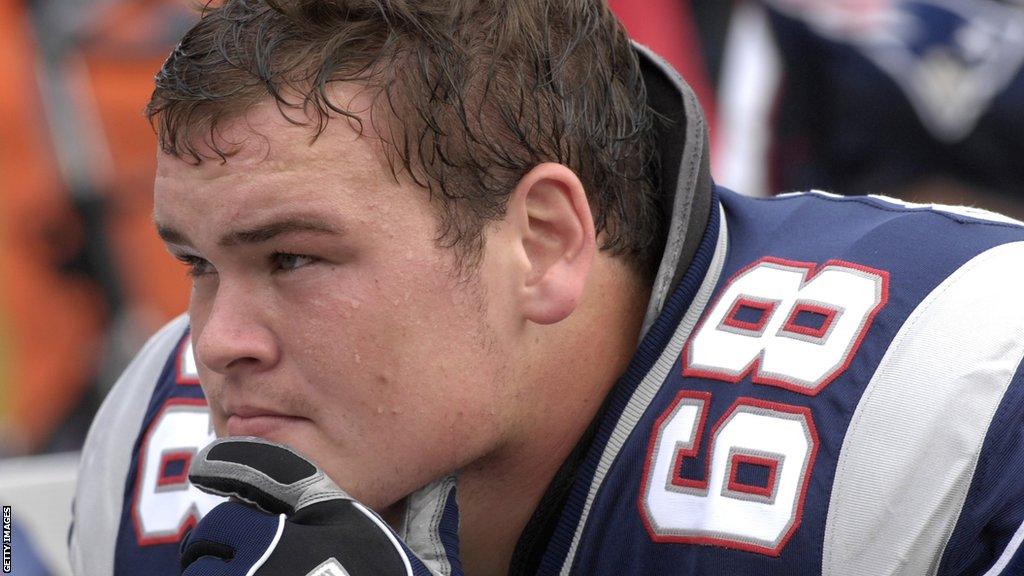
Ryan O'Callaghan played 51 games in the NFL between 2006 and 2011
Warning: This article contains references to suicide and mental health issues.
"When you get to the NFL and they hand you a million dollars, it's hard not to have a little bit of fun, but I never once loved the game."
Taken at face value, that statement by Ryan O'Callaghan - a former offensive tackle with the New England Patriots and the Kansas City Chiefs - seems hard to believe.
The 6ft 7in, 330lb Californian had risen to the pinnacle of American sport, protecting legendary quarterback Tom Brady on the pitch, and enjoying all the trappings of fame away from it.
So how could he not love the game?
"The only reason I played football to begin with was that I realised it was a great cover for being gay," O'Callaghan explains.
"I relied on everyone's ignorance, assuming that gay guys can't play American football, and I took advantage of that.
"And you know what? It worked, for almost 30 years."
'I was going year-by-year, hanging on for dear life'
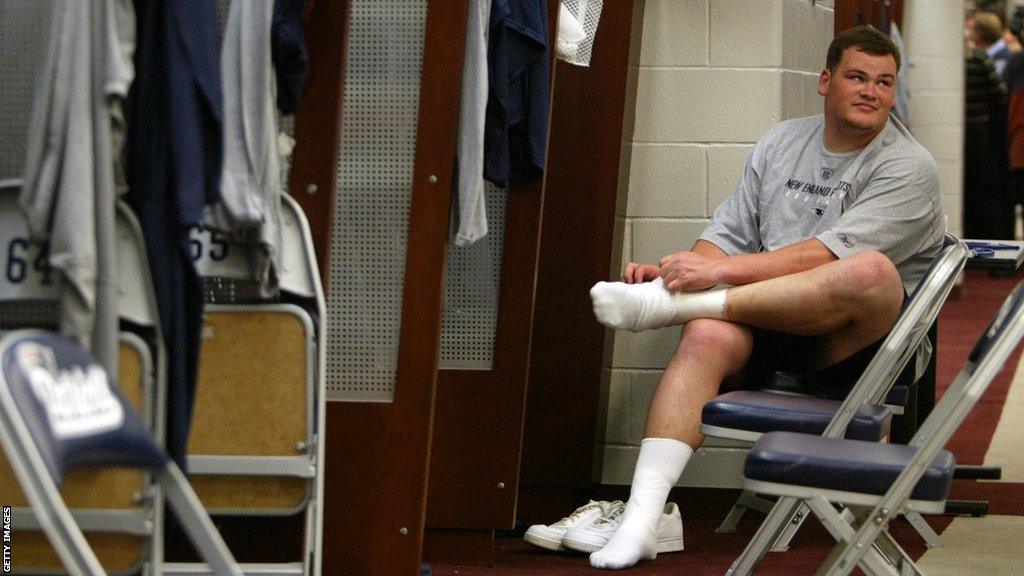
O'Callaghan was being picked out as a name to watch before he was drafted by the Patriots in 2006
Born in 1983, O'Callaghan's football journey began in high school, where the Californian's natural size and strength meant coaches were eyeing him up as a potential standout player from an early age.
Success at that level led to a four-year stint at the University of California, where O'Callaghan earned the Morris Trophy as one of the Pac-10 Conference's top offensive linesmen - and by the time of the NFL Draft in 2006, experts were picking him out as one of the names to watch.
Then aged 23, he was selected by the New England Patriots in the fifth round, and so joined one of sport's most storied franchises.
But while, to an outsider, O'Callaghan was on a seemingly pre-ordained journey to the big time, the Californian knew the only reason he was playing at all was to hide the fact he was gay.
At a young age, he'd taken a conscious decision to find the 'straightest' thing he could think of - being an NFL star - and then become it to deflect questions about his own sexuality.
It didn't matter that he didn't like the game.
To O'Callaghan, football was more than just a sport. It was a shield.
"I was going year-by-year, hanging on for dear life, just trying to figure something out to stay covered," he admits.
"So to get drafted was a huge sigh of relief."
'Everything was centred around staying closeted… it's no way to live'
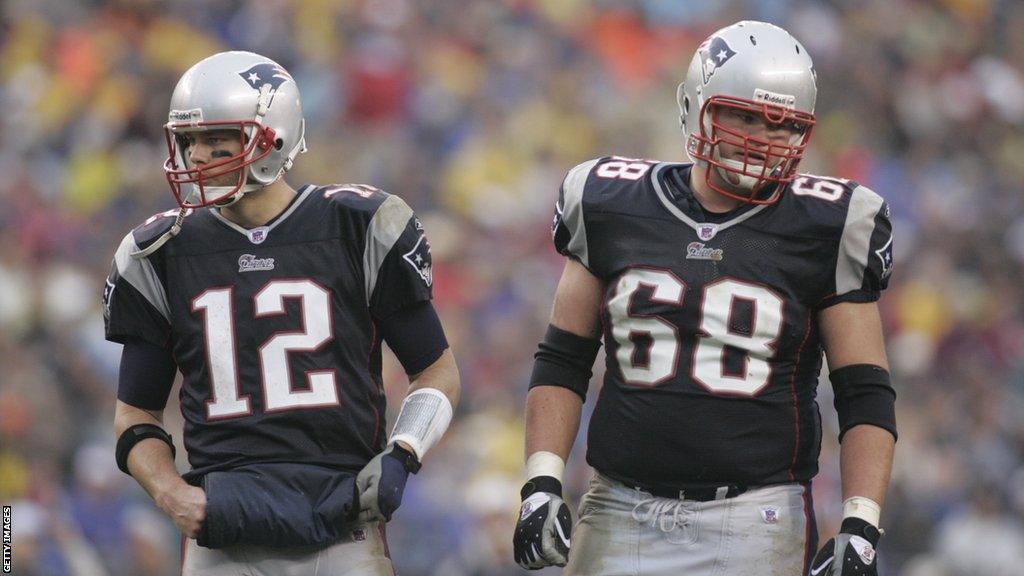
Tom Brady and Ryan O'Callaghan were team-mates at the New England Patriots
Once on the roster at the Patriots, O'Callaghan was thrown in at the deep end.
Still a rookie, he was tasked with playing in front of Brady - one of the greatest to step on to the gridiron.
But as O'Callaghan's playing career went from strength to strength, the stress of concealing his sexuality was taking a serious toll.
"I was a disaster," he admits.
"I was every kind of miserable there was, and constantly worried about being outed. I never once did anything with another guy when I was playing football so there was never anyone who could out me, but I was always paranoid that somehow, someone would find out.
"Everything I did was centred around staying closeted. I wasn't trying to make the team to make money - although that was nice and I needed that to survive. It was to stay closeted, that was my whole mindset.
"It's no way to live."
'I wanted nothing other than to not feel like myself'
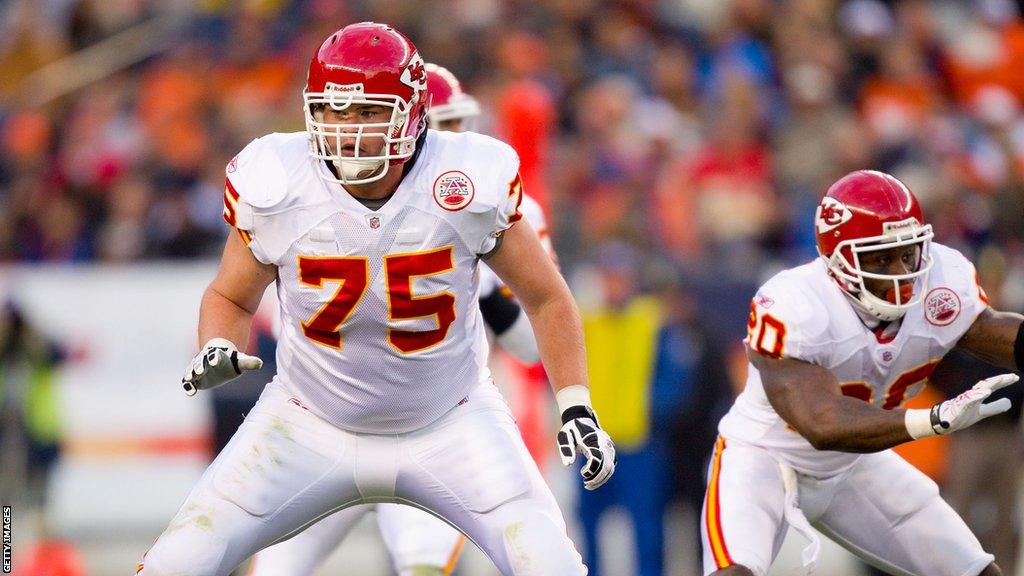
O'Callaghan moved to the Kansas City Chiefs in 2009
As the seasons racked up, O'Callaghan's pain increased.
The grind of elite-level football, first in college and then the NFL, left the Californian with shoulder and groin injuries he couldn't shake.
And haunting him at every turn was the fear that he'd be outed.
"Every night, laying there before bed, it was chaos in my own mind," he says.
"What kept me going was trying to keep my story straight, and the whole time I was closeted, I never spent 10 minutes considering whether it would be OK if I came out. I was just so consumed in the negative, I never gave myself a chance to think about whether my family, my friends would accept me."
So O'Callaghan - who had now moved to the Kansas City Chiefs - started taking painkillers, hoping to numb the impact of his physical injuries, but also wishing for something more.
"At that point in my life, I wanted nothing other than to not feel like myself," he says.
"So I quickly became a full-blown addict, taking all the painkillers I could get my hands on. I was very lucky I didn't overdose, but back then, I didn't care. That would have been the easy way out.
"I think a lot of people who are addicts think they're doing a good job of hiding it, but it's easy to tell for a professional, and our trainer noticed I was acting a little off."
'It was a common sense thing, but that had never even crossed my mind'
That trainer recommended O'Callaghan speak with Dr Susan Wilson - a witty, fast-talking clinical psychologist who, in many ways, was the polar opposite of the Californian.
Years of hiding who he was had persuaded O'Callaghan that he'd be able to fool her as well.
But as the strain of concealing his sexuality pushed his mental health to breaking point, O'Callaghan realised he had to let her in.
"It was clearly going to be my last season in the NFL with all the injuries mounting up, and my plan was to end my life at the end of my career," he says. "So one night, I emailed her after months of talking, saying I wanted to meet.
"It took a long time, sitting in that room across from her, for me to muster up the courage to tell her I'm gay - but I did, and she stood up and gave me a hug.
"I told her my plan of ending my life due to all my worries of what other people would think and, in a more professional manner, she basically said: 'Well, if you're just going to kill yourself, why don't you find out if you need to, and whether these people you're so worried about are going to accept you?'
"That's just a common sense thing, but that had never even crossed my mind because I was just done with it. And I'm thankful for her words and helping me come up with a plan."
Slowly, O'Callaghan began to tell people his truth.
He came out to his family and his close friends in 2012, and then - after getting clean and putting his life back together - he shared his story publicly in 2017.
"You don't go from hating yourself and planning on dying to being fine overnight, and I felt like I needed to live my life as a gay man," he says.
"And my original intention was not to come out publicly, but as the years went on, I was sitting back waiting for someone else to do it, and it just didn't happen."
'The goal in life is to wake up and be who you want to be, and I get to do that'
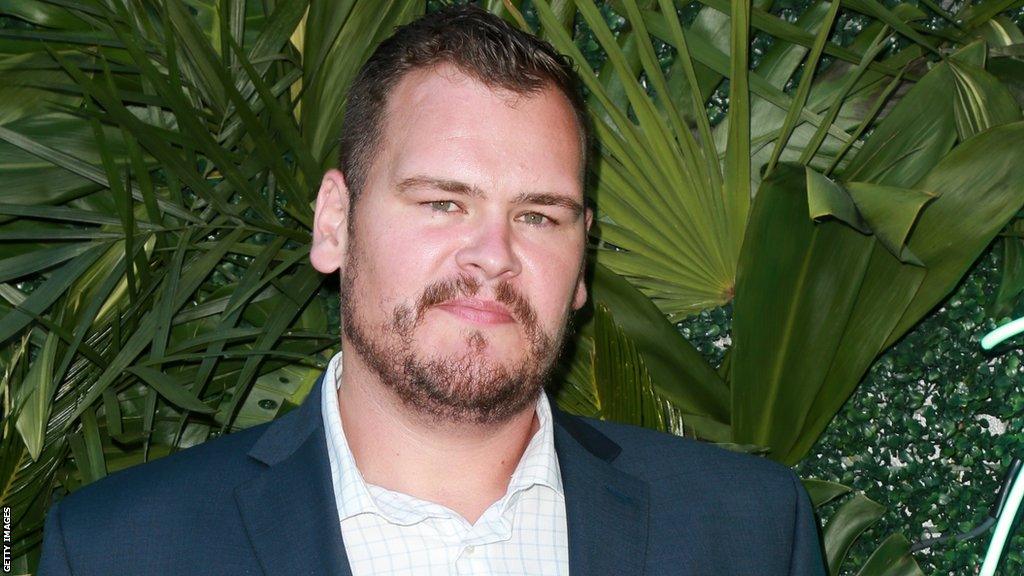
O'Callaghan set up his own foundation after retiring
So O'Callaghan came out to the world, and embraced the platform that came with it.
The Californian now has his own foundation that works to create more opportunities for LGBTQ+ athletes, and partners with the NFL to promote the importance of diversity and inclusion.
And, more than that, O'Callaghan shares his journey to help those who - like him - once thought they could never be their authentic selves in sport.
"There are still people out there who are deeply closeted and feel like they would never be accepted," he says.
"Obviously, everyone's circumstances are different, but I tell my story because there are a lot of people out there who feel like they can't be themselves, when I strongly think people should just give it a chance.
"The goal in life is to wake up and be who you want to be and do what you want to do, and I get to do that. I get to control my own future.
"And I think a lot of the time, if I'm having a bad day, I look back and go: 'well, I made it through that - so this ain't going to be too bad!'"
If you, or someone you know, have been affected by any issues raised in this article, support and information is available at BBC Action Line. You can also contact the Samaritans on a free helpline 116 123, or visit the website., external
Ryan O'Callaghan was speaking to Jack Murley on the BBC's LGBT Sport Podcast. You can hear new episodes every Wednesday on BBC Sounds.